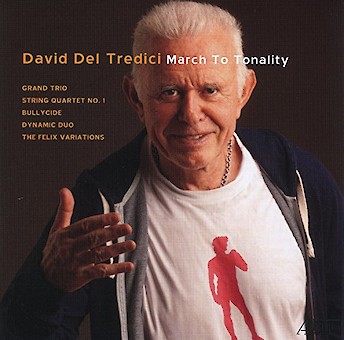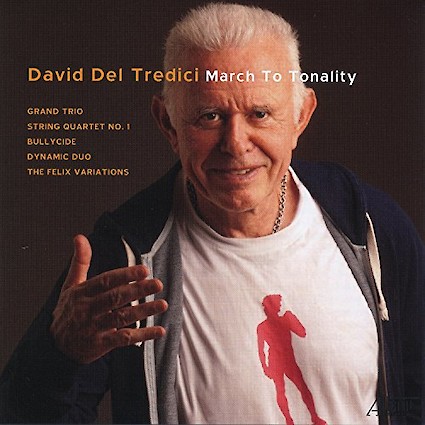Yaddo Artist Medal
11/9/2017
Commissioned by, dedicated to, and inspired by my nephew, Felix Del Tredici.
Behind these dedicatory words lies a family story. I am the oldest of five – four boys and a girl. As well there are grandparents, aunts, uncles, cousins galore – and not one of these is in the least musical. For the longest time I was the lone musician in the family. That is, until my nephew Felix came along. Felix at the tender age of 20 had developed into a virtuoso bass trombone player.
There is a family tradition: all of the East Coast brothers – David, Robert, Peter – gather for Christmas at Peter's house in Boston. In 2010, my brother Robert came and brought along his son Felix, trombone in hand. Robert had (of course) raved about Felix, but I had never heard him play. Well, play he did – so brilliantly, so unexpectedly musically and imaginatively that it took my breath away, and in that moment I decided to write him a piece. As I recall now, for three days after Christmas that year, a horrendous blizzard gripped the East Coast. Luckily, I had gotten back to New York City before it struck, but I was then trapped in my apartment. In those three days, I wrote my Felix piece: a set of variations on the famous theme of Paganini's 24th Caprice. Although this theme has for centuries inspired sets of variations from the greatest composers, I nevertheless decided to take it on.
The Felix Variations has (appropriately for a Tredici!) thirteen variations, the last of which is longer – a Finale. That one could write for the bass trombone with almost violinistic agility confounded me – but I had just heard Felix do it. As well, he had shown me exotic trombone "effect" known to few, had demonstrated the wealth of muting possibilities, the drama of super low notes and the virtuosity of "impossible" high notes. All this put into the Variations and for good measure a quote from my signature piece, Final Alice.
Felix premiered the piece (his NY debut) on April 20, 2012 at (le) Poisson Rouge in New York City. It was a celebration of my 75th birthday. I received no greater gift than that night's dazzling performance by my nephew, Felix.
March to Tonality presents a David Del Tredici with whom listeners may be less familiar. Rather than the action-packed vocal and large ensemble music that is his calling card, this collection of chamber works, all recorded for the first time, showcase Del Tredici’s dense, dramatic writing for chamber forces.
The double-album opens with Del Tredici’s Grand Trio. The rippling energy of the opening figure from pianist Steven Beck sets the pace for the first three movements, which are all played attacca. Throughout this thirty minute climb, Del Tredici recontextualizes several familiar musical fixtures in their synthesis. As the work unfolds, moments reminiscent of Mozart, Mahler, and Mingus flow together elegantly, building towards the dramatic climax of the work, which (of course) is a fugue. The work closes with its shortest movement, Reminiscence – Allegretto amabile. Aptly titled, this movement looks back on the the rest of the work with a nostalgic, rose-tinted filter.
String Quartet No. 1 occupies the final three tracks of the first album. Innocence and Experiencecontain many tender moments, but the heart of this work is in the third movement, Grosse Tarantelle. This final third moment is nearly twice as long as the first two movements combined, and sustains the ecstatic energy of the opening throughout the entire movement. Even as the music slows later in the movement, one still hears vestiges of the opening figure rippling through the ensemble.
The tragic story of teen suicides inspires another of the pieces. Exactly halfway through Bullycide, the names of five young people who took their lives due to bullying are whispered. Again, in another work, an overtly emotional moment like this might betray the material that both precedes and follows it, but both Del Tredici’s pacing and the intimacy of the ensemble’s playing allow this to be the piece’s highpoint.
Not to be overlooked in the midst of the other, significantly larger, pieces on this double album, the chemistry of violinist Mark Peskanov and bass trombonist Felix Del Tredici brings this unusual combination together seamlessly in Dynamic Duo. While the Batman reference is (presumably) unintentional, it is still somewhat apt. In Del Tredici’s Dynamic Duo, the bass trombone is a clear leader, outfitted with equipment and skills to boot. Del Tredici presents a broad spectrum of possibility for this instrument through mutes and extended techniques, including singing through the instrument to create a haunting, metallic echo of the human voice.The final track, The Felix Variations, showcases Felix Del Tredici in a solo format. Initially unsure what else the bass trombone had to offer, each variation seemed to scold my lack of imagination, presenting a rich palette of colors and textures while never compromising expression for effect.
Grand, never gauche, and cunning without camp, Del Tredici toes a fine line in embracing a postmodern aesthetic without the emotional separation of irony. The constant rise in dramatic tension across the first half-hour of the Grand Trio, the disproportionate length of the finale of String Quartet No. 1, and the use of a myriad extended techniques in Dynamic Duo and The Felix Variations all prove powerfully expressive. March to Tonality is a longer play, but didn’t out stay its welcome.

11/9/2017


